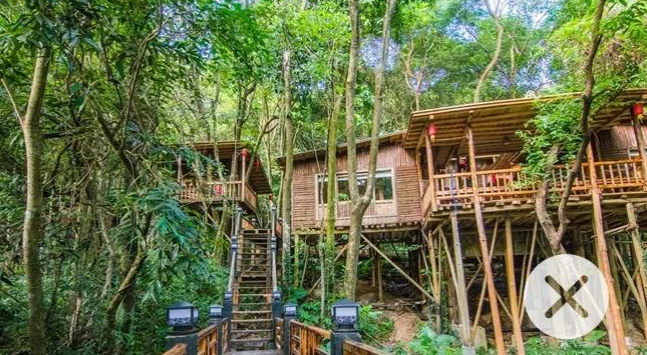
According to Feng Shui, “villages and towns with trees are like people wearing clothes.” The trees near a residence are as important as the clothes on one’s body. They serve as a protective barrier, blocking negative energies from outside while also inviting positive Qi into the home.
However, not all trees bring prosperity and good fortune。 If there are inappropriate trees near your home, they can form “Tree Negative tree energies, affecting daily life. It is essential to adjust Feng Shui to resolve these negative influences.
Overhead Tree (Pressing Roof Tree)
The Overhead Tree refers to a tree whose branches and leaves obstruct your roof, creating a “mountain pressing down” formation。 This signifies suppressed fortune for the household, making it difficult for family members to achieve success in wealth accumulation or career advancement。 Obstacles abound, leading to unsatisfactory results。
Climbing Wall Tree
The Climbing Wall Tree refers to vines or plants that grow on the exterior walls of a residence, with climbing Tiger as a typical example. These plants often have dense foliage, covering entire walls and blocking sunlight。 This leads to excessive dampness and insufficient Yang energy inside the home, negatively impacting family health。
Moreover, the roots of these plants can corrode walls, causing cracks and potential structural issues like water seepage or wall collapse, posing serious safety hazards。
Destructive Root Tree (Break Home Tree)
The Destructive Root Tree refers to trees whose roots penetrate a home’s foundation。 From a Feng Shui perspective, this indicates an unstable foundation for the household, leading to failed endeavors and financial losses, ultimately resulting in decline and poverty。
Scientifically speaking, this is extremely dangerous as tree roots can cause ground subsidence, leading to house tilting and significant structural hazards。
Dry Tree
A dead or diseased tree near a home is undoubtedly unlucky and unappealing。 A Dry Tree has lost its vitality and carries decline energy, negatively impacting nearby Feng Shui。 Living in proximity to such trees can lead to worsening family fortune, leaving residents isolated, poor, and unfortunate。 It’s advisable to remove these trees。
Unlucky Tree
An Unlucky Tree refers to trees with negative connotations, such as pines and cypresses, often associated with graveyards。 Planting them near a home is considered inauspicious and can disrupt Feng Shui harmony。 Chinese toon Tree (Cinnamomum camphora) is also discouraged, as it can lead to poverty and financial struggles for the family。
Additionally, there are folk sayings regarding tree planning: ‘Don’t plant elms in the east, peaches in the west, mulberries in the front, or willows behind.’. ” This means:
-Don’t plant elm (Elsholtzia) in the east.
These sayings serve as warnings about tree placement for optimal Feng Shui harmony。
Leave a Reply